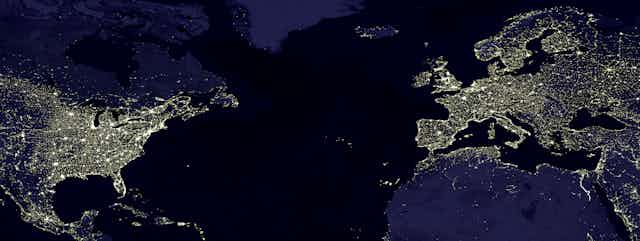Just over ten years ago the Nobel Prize-winning atmospheric scientist Paul Crutzen coined the term “Anthropocene” for a globe totally transformed and dominated by humans, a state he suggested we were in now. Although this idea was not totally new, the term Anthropocene caught on and is now regularly used outside the environmental and earth sciences.
Perhaps the appeal of the term is partly because it adheres to the traditional suffix of “-cene” which in geology indicates a geological epoch, such as the two most recent epochs, the Pleistocene (from 2.5m years ago) followed by the Holocene, technically the current geological period from the beginnings of agriculture around 12,000 years ago to the present day.
In 2009 it was suggested to the world’s authoritative geological bodies that the term should be formalised – something much easier said than done. Defining geological boundaries has never been easy and several important boundaries have only been formally defined in the past 20 years. Geological boundaries are, to a large extent, arbitrary – even political – but they are essential. As the bedrock of geology they are the only way of correlating rock sequences and usefully discussing Earth’s 4.5 billion year history.
Several geological committees in the UK and other countries are looking at whether the Anthropocene should be defined as a new geological period and, if so, what type it should be and when it should start. The idea is that the Anthropocene period relates to, and takes its name from the time in which humans have come to completely dominate the planet. When that period began is moot, with some believing it must be a gradual process, affecting some parts more than others over many millennia.
Others favour the idea of using the spike in radionuclides associated with the nuclear age as a marker, while others still believe such dominance is yet to happen. Myself, and others, would argue that it could be dated back to the adoption of agriculture, over the past 6,000 years.

Why is this of importance to anyone, even other academics, outside the slightly dusty realm of the earth sciences? There are several reasons, some pragmatic, others more theoretical. Geological classification is used by other disciplines, most notably archaeology and engineering.
A formalised Anthropocene would have little effect on engineering, but it would put archaeology - the study of human activity in the past - in a curious position, namely that of having the vast majority of its subject matter (with a few exceptions such as Cold War archaeology) placed into a past, and by implication pre-human geological period, the Holocene. The disparity would only enlarge the gulf between geological and archaeological ways of looking at the past.
It is also difficult to see how this would work in relation to geological maps, as the period assigned to a rock deposit is based on its known age. Even sediments of human origin might or might not be of Anthropocene age, depending upon where the boundary was set.
And what of the existing Holocene epoch, which would end at the beginning of the Anthropocene? It could be unfeasibly short, just a few thousand years, raising the question of whether it was sensible to have carved the Holocene out of geological time in the first place. The principal reason it was separated from the Pleistocene, which itself contains more than 50 similar globally warm periods between ice ages, was that it was the geological period during which human civilisation had evolved.
More theoretically but equally important is that the rules of geological taxonomy were never designed to identify a boundary falling within recorded history and which is not based on natural geological changes. The whole question is reminiscent of the famous statement by the historian Francis Fukuyama who in response to the collapse of socialism in 1989 declared that history was dead. It clearly wasn’t but the world had changed fundamentally, and likewise the Anthropocene would be a geological period like no other.
Given these difficulties one is forced to wonder why bother? Its advocates argue that recognising the Anthropocene might move society towards a more sustainable path. This is not the purpose of the geological column, and raises the concern that this is about funding priorities: in a world where research funding is increasingly driven by political agendas and relevance, it’s clear that the Anthropocene could quite wrongly be seen as somehow more relevant and worthy of funds than other areas.
So does this academic debate serve any positive purpose? Yes, in that it has forced earth scientists to look deeper at how we recognise, define and demarcate the human component in all parts of the earth system and not just climate. Humans clearly do not act in isolation, and complex fluctuations exist in the atmosphere and oceans that are driven by factors outside of human control. Whether or not the Anthropocene is formalised there is little doubt that we are living at a critical period in Earth’s history, as the world changes around us.

